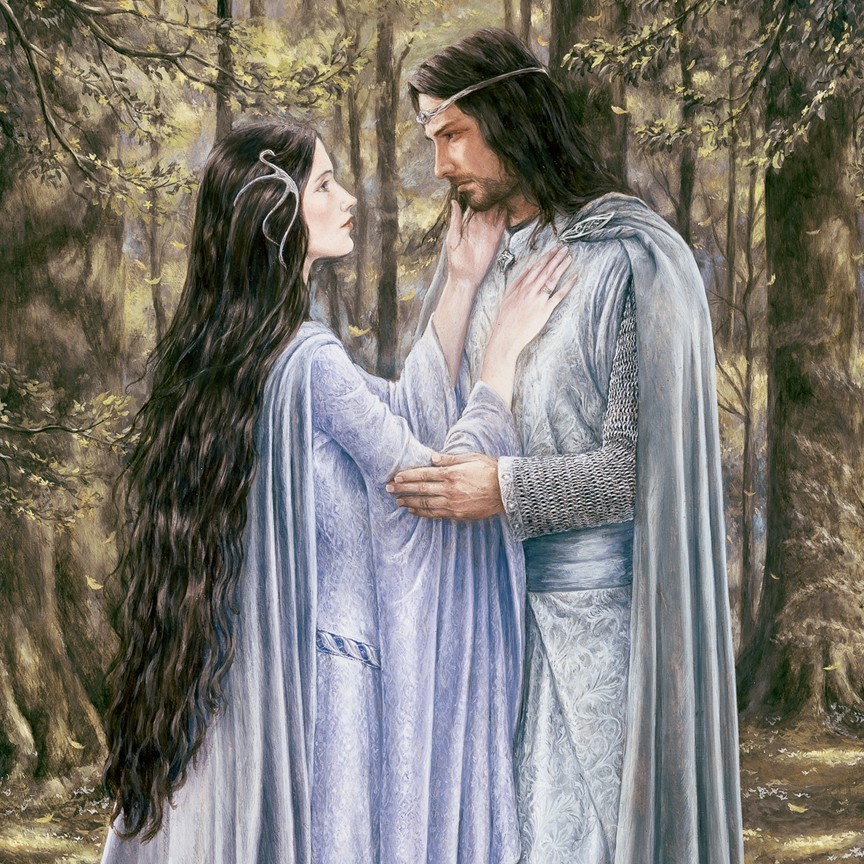The Fellowship of the Ring by J.R.R Tolkien (HarperCollins 1991) pp.341-343
In last week’s post we entered Frodo’s inner world of longing, of his heart’s desire, but he is not the only one who, upon this sacred hill of Cerin Amroth, goes deep within his own soul and there for a brief moment becomes that longing, his own sehnsucht. As Frodo descends the hill he finds Aragorn there, “standing still and silent as a tree”. In his hand Aragorn is holding a flower of elanor and he is “wrapped in some fair memory”.
So intensely does Aragorn enter his memory that, for a moment, he becomes the man that he was in this place, so many years before. Frodo, whose own inner sight is now so keen, sees the “grim years” removed from Aragorn’s face and once again he seems “clothed in white, a young lord, tall and fair”. Those who have read the story of Aragorn and Arwen that is told in an appendix at the end of The Return of the King will remember that this is exactly how Aragorn appeared when he and Arwen stood on this very spot and pledged their love to each other.

Aragorn is the young lord, tall and fair, standing before Arwen in that moment, but he is also entirely present in this moment within a story whose ending he cannot see. And it is in this moment, as well as that, that he speaks aloud.
“Arwen vanimelda, namarië!”
Tolkien chooses here not to translate the words, spoken in Quenya, the language of the High Elves of the West. Those who really know languages, as he did, know that translation is a dangerous affair. Albert Schweitzer, the great German scholar of the nineteenth and twentieth centuries, used to speak to English speaking audiences from time to time but although he could speak English perfectly well he always chose to speak in German and with an English translator because he felt that he needed his first language in order to speak most truly and meaningfully. Aragorn is a true son of Númenor, the heir of Elendil, the elf friend, and lord of the Dunedain, the men of the west who have remained true to this story. He speaks now aloud from the deepest place within his heart to the one who holds that heart forever.
Tolkien does not translate these words here but he does translate one of the words a little later in the story.
Namarië.
His translation there is of Galadriel’s song that the Fellowship hear just before they part from her. We will think about that song on another occasion but here it is enough to say that Tolkien translates the word as farewell. So is Aragorn bidding farewell to his beloved, the fairest beloved that he addresses in the word, vanimelda? Is this a goodbye, an adieu, a last ‘God be with you’? In one sense it is but I want to think about this farewell in a certain way, a way that I think emerges from a reading of Aragorn’s story from the failure to cross the Misty Mountains in the pass below Caradhras and Gandalf’s decision to go through Moria.
At this point there is a sense in which Aragorn loses hope. By this I do not mean that he gives in to despair, that he gives up, but that whatever sense that he had, that Frodo would succeed in his mission and that his deepest longing, his longing for Arwen, would be fulfilled has gone. In the pages ahead we will read of Aragorn and hope on a number of occasions and each time it will be in the sense that he must do without it. He must carry on until the end of his road wherever that leads simply because he must, because he has promised to do so. The German mystic of the middle ages, Meister Eckhart, coined a word (German is a wonderful language for doing such a thing!) that probably translates best as farewelling. For him this meant the purest form of detachment in which the soul chooses to refuse attachment to anything less than God. Aragorn does not have such faith in God, not in Eckhart’s Christian sense anyway, but this most heart rending of passages in all of Tolkien’s works ends by leaving open such a possibility.
“Here my heart dwells ever, unless there be a light beyond the dark roads that we must still tread, you and I.”
Unless there be a light.

Postscript
I have written before about the love story of Aragorn and Arwen and if you wish to read these posts please click on the tags, Aragorn and Arwen, and The Love of Aragorn and Arwen, below this week’s post. And if there are any scholars of Tolkien’s languages reading this please leave a comment below. I would love to learn from you, and others who have been touched by what I have written about this week.
A final thought. My own feeling is that the best translation into English of Aragorn’s words is “Arwen, O fairest beloved, farewell.” Do others agree or would you put it differently?
The word “vanimelda” needs almost three pages of Parma Eldalamberon 17 to figure out.
A bit like Jacques Derrida’s oration at the funeral of Emmanuel Levinas that he published under the title, Emmanuel Levinas Taught Me to Say Adieu. Adieu, a word that the French can say without thought but is rich in content. Or would the Elves (or Numenoreans) always be aware of that content, all three pages of it?